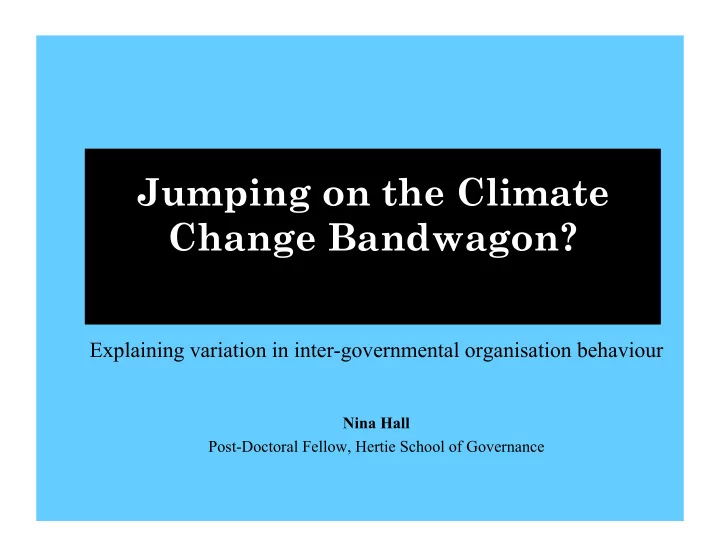

Jumping on the Climate Change Bandwagon? Explaining variation in inter-governmental organisation behaviour Nina Hall Post-Doctoral Fellow, Hertie School of Governance
Research Questions Why do international organizations bandwagon on the climate change regime? And how can we explain variation in bandwagoning behaviour?
Structure • Defining Bandwagoning • Climate Change and Bandwagoning • Comparison: UNHCR and IOM • Explaining Bandwagoning • Conclusion
Defining Bandwagoning • When an IGO strategically links its regime to another (Jinnah 2011). • Includes: publications of speeches, policy papers or reports that substantiate a link. • Distinct from cooperation.
Contributions Bandwagoning – varies in terms of extent and nature (not binary) Explain variation in bandwagoning 1. Functional organisations more opportunistic 2. Normative organisations more reluctant Trace how existing organisations are responding to climate change
Attendance at the UNFCCC 120 100 80 Number of IGOs 60 40 20 0 1994 1996 1998 2000 2002 2004 2006 2008 2010 2012 2014 Date of Conference of the Parties (COP)
Case Study Comparison UNHCR and IOM had no mandate for climate change displacement Both attended UNFCCC in 1998, 2007, 2008, 2009, 2011 and 2012. Compare: first engagement, staff resourcing, inter-agency work, operations.
First Engagement
Staff Resourcing
Inter-Agency Standing Committee (IASC)
Operations
1. Statist Accounts
2. Substantive Issue-Linkage A real, or perceived to be real, causal relationship between two issue-areas (Betts 2010).
3. Resource Dependency Theory IOs seek tangible and intangible resources to survive (Bierman 2009; Gest and Grigorescu 2011). Bandwagon to: - Tap new financial resources (Axelrod 2011) - Access expertise in a new issue (Jinnah 2011) - Increase organisational relevance (Conliffe 2011)
Organizational Type and Bandwagoning IGO Type Defining Characteristic Case Study Functional No mandate to promote IOM: bandwagoned to a norms or supervise law. greater extent Normative Mandate to supervise UNHCR: more reluctant international law. to bandwagon
Conclusion • Overall inter-governmental organisations have increasingly bandwagoned on climate change • Variation in extent of bandwagoning – UNHCR vs. IOM • Organisational type explains this variation
Limitations and Next Steps Generalisability – hypothesis generating, need to examine other cases. Relationship between bandwagoning and regime complexity and fragmentation Normative and policy implications – when is bandwagoning good?
Recommend
More recommend